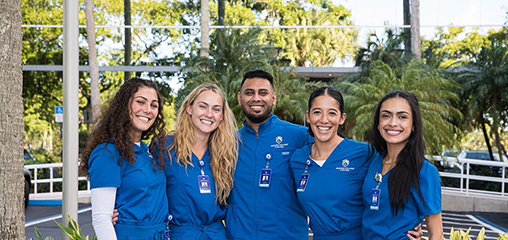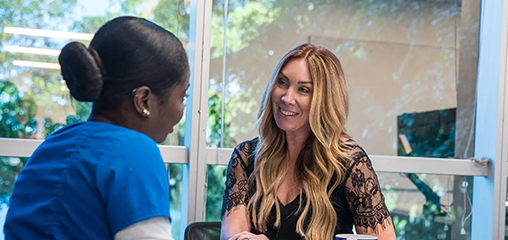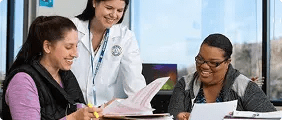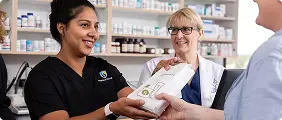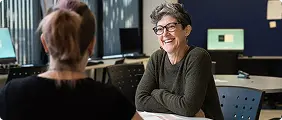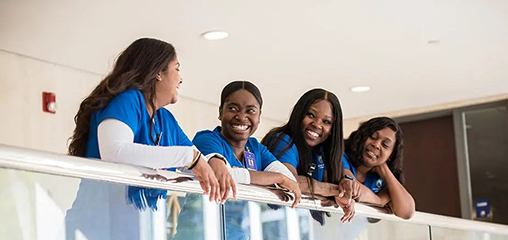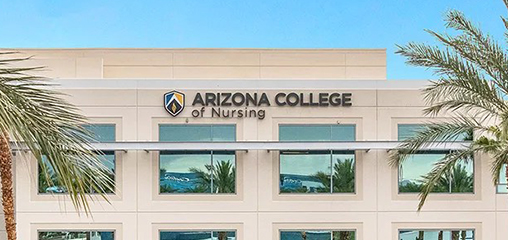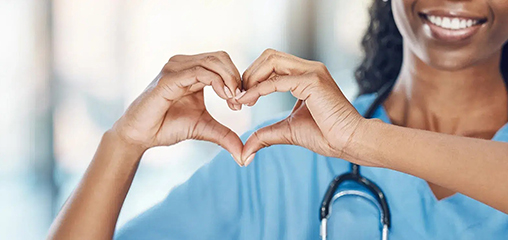Massage Therapy Program Course Descriptions
Classes begin March 23rd
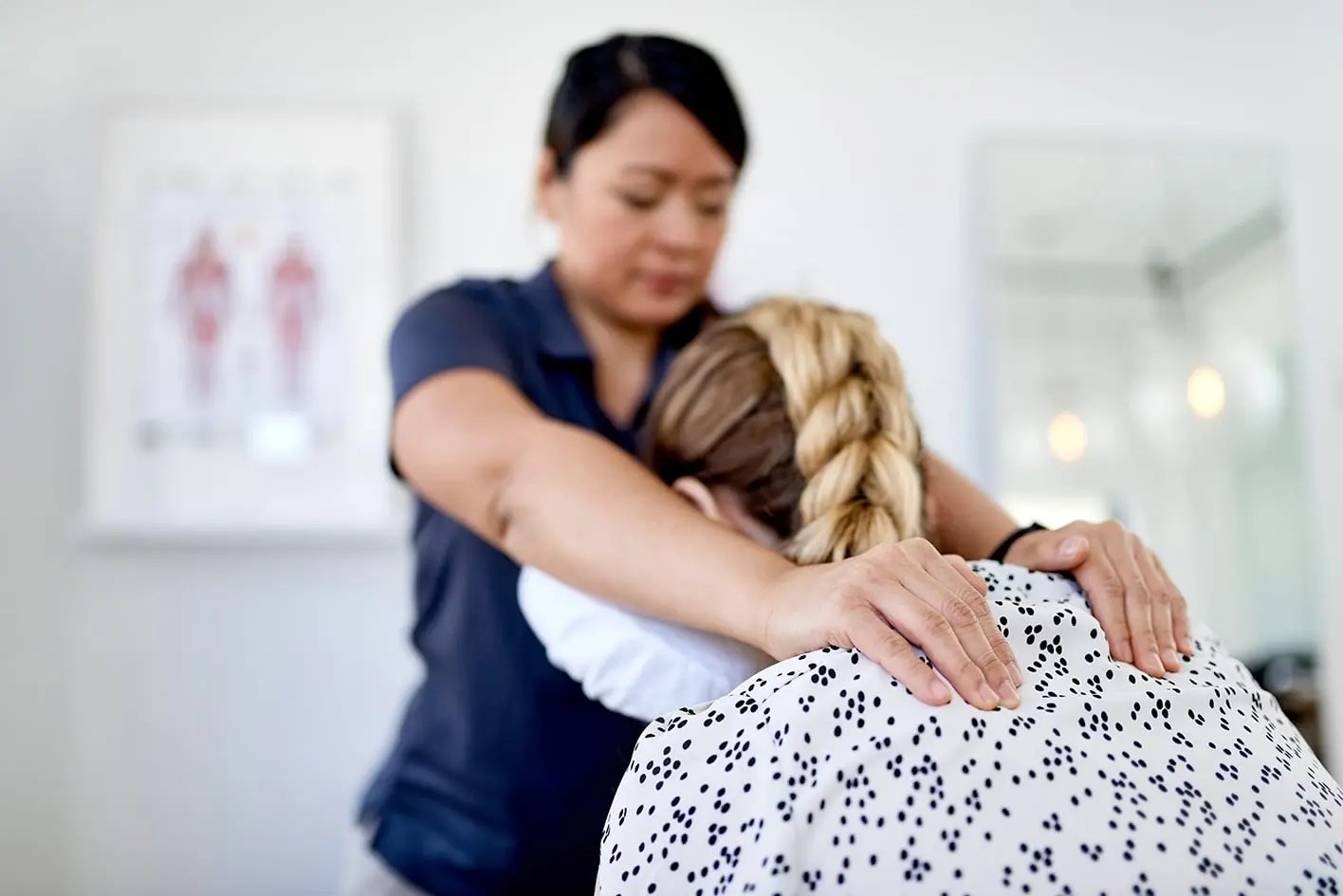
Massage Therapy Program – Schedule Of Courses
Arizona College’s Massage Therapy program is comprised of 850 clock hours and can be completed in eight and a half months. Graduates of Arizona College are eligible for state licensure without passing a national certification exam. Our program prepares graduates to sit for the Board Certification Exam (NCBTMB) and the Massage and Bodywork Licensing Examination (MBLEx). Requirements for licensure in states, municipalities and townships differ; therefore, it is recommended that students determine what is required for licensure where they are planning to work.
Massage Theory & Technique Course Descriptions
Massage Therapists treat clients by using touch to manipulate the softtissue muscles of the body. Therapists utilize a variety of massage techniques and modalities to accomplish pain relief, rehabilitate injuries, reduce stress, increase relaxation and aid in the general wellness of clients. Lecture and Lab units measured in contact hours.
Massage Theory & Technique: MTM 125
Massage for Special Populations
Lecture: 20, Lab: 20
Massage Theory & Technique: MTM 155
Swedish Massage
Lab: 40
Learn More
Students will learn how to create a comfortable environment and practice designing a full body Swedish massage. Emphasis will be given to cautions, contraindications and foundation skills for massage, including confident draping, body mechanics, self-care and confidence in opening and closing a massage treatment session. Prerequisite: None
Massage Theory & Technique: MTM 185
Eastern & Energetic Approaches
Lecture: 20, Lab: 20
Learn More
Holistic medicine and natural wellness will be taught, including personal efforts to achieve balance of physical, mental, emotional, social and spiritual aspects of health. The student will learn how to use adjunctive modalities from eastern and energetic origins. Prerequisite: None
Massage Theory & Technique: MTM 195
Client Care in Massage Therapy
Lecture: 20, Lab: 20
Learn More
In this course, students will learn how to tailor their massage to a client’s needs and goals. Understanding the documentation process for a wellness massage in assessment, treatment and planning for the greatest care of the client. Prerequisite: None
Massage Theory & Technique: MTM 200
Clinical Practicum
Lab: 30
Learn More
A supervised clinic consists of 30 hours and is taken to prepare for the professional environment. The clinical internship is designed to provide a forum for students to learn how all the classroom material fits together. The clinical practice hours are unpaid to polish your practical skills. Prerequisite: None
Massage Theory & Technique: MTM 300
Advanced Clinical Practicum
Lab: 100
Learn More
A supervised clinic consists of 100 hours and is taken to prepare for the professional environment. The clinical internship is designed to provide a forum for students to learn how all the classroom material fits together. The clinical practice hours are unpaid to polish your practical skills. Prerequisite: None
Massage Theory & Technique: MTM 210
Spa Techniques
Lecture: 20, Lab: 20
Learn More
In this course, students will learn corporate chair massage, how to use it as a marketing tool and explore their options as an employee, independent contractor or starting a private practice. Students will compose their resume and cover letter and learn how to interview successfully. Hot stone massage, reflexology and essential oils will be practiced to prepare students for the spa environment. Prerequisite: None
Massage Theory & Technique: MTM 215
Sports & Injury Massage
Lecture: 20, Lab: 20
Learn More
In Sports Massage and Hydrotherapy students will learn how the muscles work together to achieve complex movement (kinesiology) and how to use hydrotherapy treatments as they relate to massage therapy. Emphasis is on the neuromuscular physiology of stretching, normal range of motion, common injuries of athletes and how to treat injuries of an acute, sub-acute or chronic nature in a pre-event, post-event or restorative environment. Prerequisite: None
Massage Theory & Technique: MTM 230
Muscular System: Spine & Thorax
Lecture: 20, Lab: 20
Learn More
Anatomy, physiology and pathology of the head, spine and thorax will be taught. Students will learn specific skeletal origins and insertions, as well as the action of facial, cranial, spinal and rib cage muscles. Additionally, students will gain understanding of scoliotic postural compensation, injuries and trigger point patterns that sometimes cause headaches and back pain. Prerequisite: None
Massage Theory & Technique: MTM 240
Spine & Thorax Palpations
Lecture: 20, Lab: 20
Learn More
The students will practice specific muscular palpation on all muscles, injuries and trigger points covered in lecture by using myofascial, deep tissue and neuromuscular approaches. Emphasis will be on clinical reasoning skills for spinal muscular conditions and postural imbalance. Prerequisite: None
Massage Theory & Technique: MTM 250
Pain Solutions in Massage Therapy
Lecture: 20, Lab: 20
Massage Theory & Technique: MTM 260
Muscular System: Lower Body
Lecture: 20, Lab: 20
Learn More
Anatomy, physiology and pathology of the pelvic girdle and lower extremities will be taught. Students will learn specific skeletal origins and insertions, as well as the action of lower body muscles. Additionally, students will gain an understanding of common postural compensation, injuries and trigger point patterns. Prerequisite: None
Massage Theory & Technique: MTM 270
Lower Body Palpations
Lecture: 20, Lab: 20
Learn More
The students will practice specific muscular palpation on all muscles, injuries and trigger points covered in lecture by using myofascial, deep tissue and neuromuscular approaches. Emphasis will be clinical reasoning skills for lower body muscular conditions and postural imbalance. Prerequisite: None
Massage Theory & Technique: MTM 280
Muscular System: Upper Body
Lecture: 20, Lab: 20
Learn More
Anatomy, physiology and pathology of the shoulder girdle and upper extremities will be taught. Students will learn specific skeletal origins and insertions, as well as the action of upper body muscles. Additionally, students will gain understanding of common postural compensation, injuries and trigger point patterns. Prerequisite: None
Anatomy & Physiology Course Descriptions
To complete the educational objectives of the college, the following equipment is utilized: massage tables, massage chairs, face cradles, massage stools, fleece covers, table warmers, massage lotion and oil, anatomy charts, a human skeleton, hydrocollator, pillows, bolsters, hot stone sets, anatomy models, sheets, anatomical videos and various other teaching aids. Lecture and Lab units measured in contact hours.
Anatomy & Physiology: MTA 105
Anatomy & Physiology
Lecture: 40
Learn More
In this course, students will get an overview of the body systems orientation of the body, along with anatomical and medical terminology. The chemistry, cells, tissues and organization of the body will be understood in relation to the physiological effects of massage therapy. Prerequisite: None
Anatomy & Physiology: MTA 130
Circulation & Body Defense
Lecture: 40
Learn More
Anatomy, physiology and pathology of the circulatory, lymphatic, integumentary and immune systems are studied; these systems work together to create the body’s defense system. Prerequisite: None
Anatomy & Physiology: MTA 135
Anatomy & Physiology: MTA 150
Business & Communication
Lecture: 40
Learn More
This course will prepare students for the expectations of professional conduct in business and marketing strategies. Students will understand therapeutic relationships and explore their options as an employee, independent contractor or starting a private practice. HIPAA standards, ethics and law, sanitation, hygiene and OSHA safety guidelines are covered. We address the professional ethics, communication skills and legal structure that students will use in the professional massage world. They will compose their resume, cover letter and learn how to interview successfully. Prerequisite: None
Anatomy & Physiology: MTA 160
Metabolic Processes, Elimination & Reproduction
Lecture: 40
Learn More
This course covers the anatomy, physiology and pathology of complex nutritional and reproductive systems. The foods eaten are digested and assimilated as the building blocks of cells, while the body eliminates the waste. Reproductive systems contain the building blocks for a new life. Students will gain an understanding of how this occurs in people’s bodies. Prerequisite: None
Request Information To Speak With An Advisor Today
Guide to Becoming a Massage Therapist
Ready to make a difference in healthcare? Explore the path to becoming a massage therapist today.
